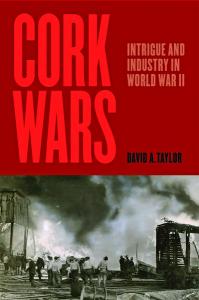David A. Taylor: Cork Wars: Intrigue and Industry in World War II
For this column, NASW book editor Lynne Lamberg asks NASW authors to tell how they came up with the idea for their book, developed a proposal, found an agent and publisher, funded and conducted research, and put the book together. She also asks what they wish they had known before they began working on their book, what they might do differently the next time, and what tips they can offer aspiring authors. She then edits the A part of that Q&A to produce the author reports you see here.
Publication of NASW members’ reports in Advance Copy does not constitute NASW’s endorsement of their books. NASW welcomes your comments, and hopes this column stimulates productive discussions.
CORK WARS:
INTRIGUE AND INDUSTRY IN WORLD WAR II
David A. Taylor
Johns Hopkins University Press, December 9, 2018, $24.95
ISBN-10: 1421426919; ISBN-13: 978-1421426914
Taylor reports:
Cork Wars tells what happened when a 1940 Baltimore factory fire set off events that caught three families up in World War II in dangerous ways. The fire consumed a half-million dollars worth of cork at a time when, before plastics, many U.S. businesses and the defense industry relied heavily on cork from oak forests in Spain and Portugal as a crucial sealant. An FBI investigation of Nazi sabotage put the cork industry and its workers in a national security searchlight.
I came across the story while researching something else. I thought it might lead to a story where natural products got caught up in national security. I looked into the company, Crown Cork and Seal, and interviewed Charles McManus Jr., who worked there during the war, and was the son of the CEO. He was in his mid-90s when we talked, but recalled vividly the Baltimore factory fire. In 2008 I wrote about the episode for Chesapeake Bay magazine. The story was picked up by NPR.I pursued two more threads of the wartime cork story through interviews and declassified OSS records at the National Archives, where I found cork industry connections. I developed the book proposal. I received many rejections. My agent at the time dropped me.
I approached Johns Hopkins University Press, knowing its commitment to Mid-Atlantic stories, American history, and technology. An editor there was interested, and I found a new agent, whom I’d known since he was a magazine editor. He helped with contract negotiation and strategic planning, getting better conditions than I would have, and helped retain audio rights. Some may ask: once you get a publisher interested, why do you need an agent to take a commission? That’s a juncture when bringing in an agent can be fruitful and easier to do.
Using an article as a springboard for a book proposal served me in selling several previous books. This time, creating a character-based narrative took longer. Besides finding an agent, my main advice to aspiring writers is to test narrative structures early with a few trusted readers.
Contact info:
- David Taylor, 202-244-3870, dataylor22314@gmail.com, www.davidataylor.org @dataylor1
- Book websites: davidataylor.org/books/cork-wars-intrigue-industry-in-world-war-ii/; hupbooks.press.jhu.edu/content/cork-wars
- Agent: Albert LaFarge, thelafargeagency.com
- Publicist: Jack Holmes, 410-516-6928, jmh@press.jhu.edu
NASW members: will your book be published soon? Take advantage of this opportunity for shameless self-promotion. Submit your report for Advance Copy.
Tell your fellow NASW members how you came up with the idea for your book, developed a proposal, found an agent and publisher, funded and conducted research, and put the book together. Include what you wish you had known before you began working on your book, or had done differently.
See https://www.nasw.org/advance-copy-submission-guidelines.
View Advance Copy archives at https://www.nasw.org/member-article/advance-copy.
Thinking of writing a book? If you are a NASW member, you may access a list of more than 150 books and online resources to help you craft your book proposal, find an agent and funding sources, negotiate your contract, learn about self-publishing, publicize and market your book, and more at https://www.nasw.org/article/write-book.
Send book info and questions about book publishing to Lynne Lamberg, NASW book editor, llamberg@nasw.org.





